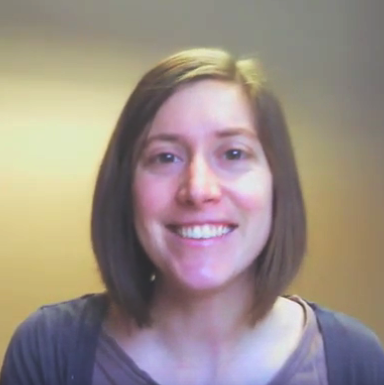By Maria C. Hosler Byler
Mosaic Conference has, in my experience, been one of those rare places where transformative relationships actually do happen. For me this started when I lived in South Philadelphia and worked at Philadelphia Praise Center/Centro De Alabanza. This multicultural congregation welcomed me – an ignorant but well-meaning white youngster – and the experience profoundly shaped my sense of God’s world and God’s mission. I am a more faithful follower of Jesus because of those communities.

The process has continued: in the Southeast Pennsylvania gathering of Mosaic youth workers, I experienced challenge and encouragement with others tasked with pastoring young people. I owe so much to my colleagues at churches who are living out God’s call in communities of faith which are different from mine. I have time and time again been called beyond myself by these friends and co-followers of Christ. These transformations in me have happened as a direct result of Mosaic Conference living out its call to relationship. There is fertile ground here for the Spirit to work.
Each year, I look forward to Conference Assembly worship. The experience of worshipping in different languages draws me to God’s action far beyond myself. I’m encouraged as I stand side by side with Christians from other congregations who are witnesses to God’s work in their contexts. Each year I feel the support of friends from near and far with whom I have affinity in Christ, even when we don’t have much else in common. Conference Assembly worship embodies the gift of this mosaic community: through ties of relationship, our differences become good news. This good news is a light we cannot hide under a bushel, but instead are called to proclaim boldly.
The key to finding good news amid our differences is in relationship. Our world is full of differences: for example, different choices abound in churches, and the effect is often that we divide and sort ourselves to find places of clarity, commonality, and comfort. When we divide and sort ourselves, we risk making God into our image.
But when differences are in relationship, that is where we encounter God who is greater than we are. That is where we receive others’ experiences to bring into our reading of scripture and discover that the Word is living and active. That is where we are challenged to grow beyond ourselves in our walks of faith: from the Jewish Christians welcoming (and being transformed through relationship with) Gentiles all the way to today.
When we divide and sort ourselves, we risk making God into our image.
As Dr. Paulus Widjaja said at Mennonite World Conference assembly in Indonesia this past summer, “It is not enough to claim unity in diversity. We should be able to go beyond that to claim diversity for unity.” Through relationship, our differences become an invitation for the Holy Spirit to transform us.
In 2 Timothy 1, Paul calls on Timothy to rekindle the gift of God that was within him, to live it out with courage. This is the call for Mosaic as well. From its formation, Mosaic Conference has been a place where the Spirit moves joyfully through God’s mission in our differing contexts. We each hold gifts, perspectives on Christ’s truth, which add to the mosaic. We are living faithfully if we live that mosaic call with power and love and self-discipline, just as has been handed to us.

Maria C. Hosler Byler
Maria Hosler Byler is an Associate Pastor at Salford Mennonite Church in Harleysville, PA where she is grateful to learn and grow with many people from different faith backgrounds following Jesus together. She lives in Souderton, PA where she enjoys taking walks in the neighborhood, eating pancakes on Saturdays, and reading with her children. They recently finished reading The BFG by Roald Dahl.

 I don’t know if the participants at Salford’s “Beyond the Talk” parents’ gathering were apprehensive before we met, but I sure was. I had planned this conversation for parents about talking with their kids about sexuality with the help of some knowledgeable and experienced congregation members. I was confident we had solid, faith-based resources to offer parents about sexuality and child development. But beyond that, I had so many questions. Were parents even interested in guidance from the church as they teach their kids about sexuality? What was the guidance of the church for parents anyway? Would parents be willing to share, or would we just sit in awkward silence? Would they even come?
I don’t know if the participants at Salford’s “Beyond the Talk” parents’ gathering were apprehensive before we met, but I sure was. I had planned this conversation for parents about talking with their kids about sexuality with the help of some knowledgeable and experienced congregation members. I was confident we had solid, faith-based resources to offer parents about sexuality and child development. But beyond that, I had so many questions. Were parents even interested in guidance from the church as they teach their kids about sexuality? What was the guidance of the church for parents anyway? Would parents be willing to share, or would we just sit in awkward silence? Would they even come? Screenagers was produced by Delaney Ruston, a medical doctor and mother of two teenagers. She shows her own family’s struggles to have a healthy relationship with technology and interviews many other teens and parents. Included in the film is psychological and brain research, as well as information on addiction, multi-tasking, and how technology is affecting academics.
Screenagers was produced by Delaney Ruston, a medical doctor and mother of two teenagers. She shows her own family’s struggles to have a healthy relationship with technology and interviews many other teens and parents. Included in the film is psychological and brain research, as well as information on addiction, multi-tasking, and how technology is affecting academics.
 “The extent to which we are surprised by the results of the election demonstrates the poverty of our relationships. The extent to which we don’t understand the need for immigration reform demonstrates the poverty of our relationships.” As I listened to
“The extent to which we are surprised by the results of the election demonstrates the poverty of our relationships. The extent to which we don’t understand the need for immigration reform demonstrates the poverty of our relationships.” As I listened to  One of the things I love about SLT is that it turns people of authority into students for a few days. The ones I’m used to seeing up front at conference and denominational events are sitting and listening, taking notes and asking questions. At SLT, we participants — the majority of us white church leaders with a significant amount of agency in our daily lives — learned from keynote speakers Dr. Cleveland and
One of the things I love about SLT is that it turns people of authority into students for a few days. The ones I’m used to seeing up front at conference and denominational events are sitting and listening, taking notes and asking questions. At SLT, we participants — the majority of us white church leaders with a significant amount of agency in our daily lives — learned from keynote speakers Dr. Cleveland and  Using illustrations from scripture and their lives, the speakers explored the depth of race’s impact on our society. They explored how our racialized society maintains itself and why it’s so hard for white people to see and confront racism — why we need people with a “view from the underside,” in Hart’s words, to recognize it. They called the largely white audience to recognize how we’ve been socialized into racial bias, and that Jesus never called us to shame but to repentance and new life together. Dr. Cleveland showed us by example how to notice privilege in our own lives. We were being tutored in how to reach beyond ourselves as a demonstration of respect and also of our need.
Using illustrations from scripture and their lives, the speakers explored the depth of race’s impact on our society. They explored how our racialized society maintains itself and why it’s so hard for white people to see and confront racism — why we need people with a “view from the underside,” in Hart’s words, to recognize it. They called the largely white audience to recognize how we’ve been socialized into racial bias, and that Jesus never called us to shame but to repentance and new life together. Dr. Cleveland showed us by example how to notice privilege in our own lives. We were being tutored in how to reach beyond ourselves as a demonstration of respect and also of our need. But it’s not just that we need each other’s perspective, or that we need to learn from one another to understand Jesus’ message. No, we each have a role to play in dismantling racism, wherever we are. When we’re uncomfortable we can benefit by staying at the table and continuing the conversation. In fact, that’s what we were doing at the conference: listening, learning, checking our assumptions and discerning our next steps. One conference attendee asked Drew Hart, “What can I do about racism in my predominantly white community?” and Hart responded, “You’re right at the center of the action!” Throughout the conference I heard calls to learn and act right where we are, building relationships with our literal neighbors. I attended a workshop where we practiced listening to people we disagreed with. In another workshop we discussed what it means to “seek the peace of the city” where you are (Jer. 29:7) and spent some time brainstorming for our own contexts.
But it’s not just that we need each other’s perspective, or that we need to learn from one another to understand Jesus’ message. No, we each have a role to play in dismantling racism, wherever we are. When we’re uncomfortable we can benefit by staying at the table and continuing the conversation. In fact, that’s what we were doing at the conference: listening, learning, checking our assumptions and discerning our next steps. One conference attendee asked Drew Hart, “What can I do about racism in my predominantly white community?” and Hart responded, “You’re right at the center of the action!” Throughout the conference I heard calls to learn and act right where we are, building relationships with our literal neighbors. I attended a workshop where we practiced listening to people we disagreed with. In another workshop we discussed what it means to “seek the peace of the city” where you are (Jer. 29:7) and spent some time brainstorming for our own contexts.